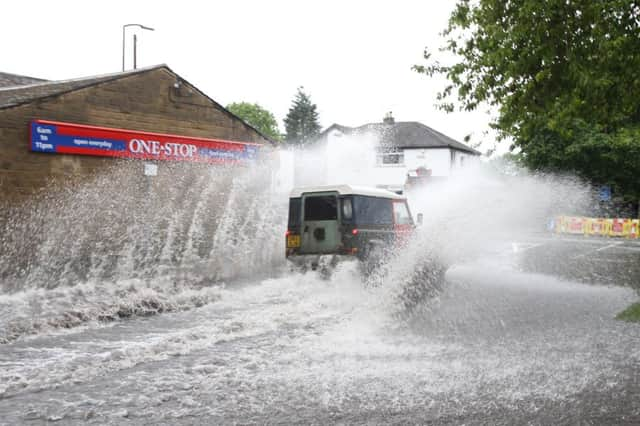Flood defences alone '˜not enough' to protect Yorkshire communities


Paul Cobbing, the chief executive of the National Flood Forum, said organisations needed to work together to tackle the issue and take a “strategic approach to managing flood risk”.
His comments came after Sheffield City Council announced it was finalising options for flood protection in the city as it moves towards developing detailed proposals for the scheme following public feedback.
Advertisement
Hide AdAdvertisement
Hide AdThe Protecting Sheffield from Flooding programme, which involves six flood alleviation schemes, will see one of the defences completed as the city marks the 10th anniversary of the floods which devastated parts of the city and claimed two lives.
Mr Cobbing said: “It’s great so far, but let’s recognise the scale of the challenge.
“Councils have got to take a strategic approach to managing flood risk and this includes focusing on planning, transport, health and well-being and economic regeneration across the country. For example, when we build a new bridge or railway, we use that opportunity to help manage flood risk in the way we design the structure. This can make a difference because we are talking a long time for flood defence schemes to come to fruition.
“At the moment there isn’t a national strategy in place.”
Mr Cobbing said a scheme set up at the Government’s request that helps homeowners in need of insurance in flood-risk areas was coming to an end in 2039 and the clock was ticking.
Advertisement
Hide AdAdvertisement
Hide AdHe said: “By 2039 we really need to have got our act together and defend all these placed so people can get insurance on the open market. At the moment we haven’t got a national strategy that allows us to do it.”
While he welcomed the news that an extensive programme to improve flood measures in the Lower Don Valley in Sheffield is due to be finished this summer, he warned that flooding could hit at any time.
Flash floods affected the North York Moors in the summer of 2005, which saw a sudden deluge of rain and a 4ft wave of water sweep through Ryedale, leaving householders battling through river mud and raw sewage to salvage what they could of their possessions.
Mr Cobbing said: “The issue is since 2000 all our major cities have flooded. The top line is it’s not a question of if a place is going to flood again, it’s a question of when, and its about making sure that the measures we have got in place are successful so people’s lives and businesses aren’t impacted.
Advertisement
Hide AdAdvertisement
Hide Ad“Sheffield is still at high risk at the moment, but it’s not about building a wall and the risk has gone away, it’s about saying how do you manage the risk with an overall strategy.”
Sheffield’s approach to managing floodwater will begin with slowing the flow of water upstream before it enters the city. This involves natural flood management, exploring the use of existing reservoirs, and creating flood storage areas in existing open spaces within floodplains.
The next stage of the council’s approach involves containing floodwater that does enter the city, by removing pinch points and building flood defences along rivers. Further flood resilience measures are also being considered, including securing improved river maintenance in the long-term and improved flood emergency responses.